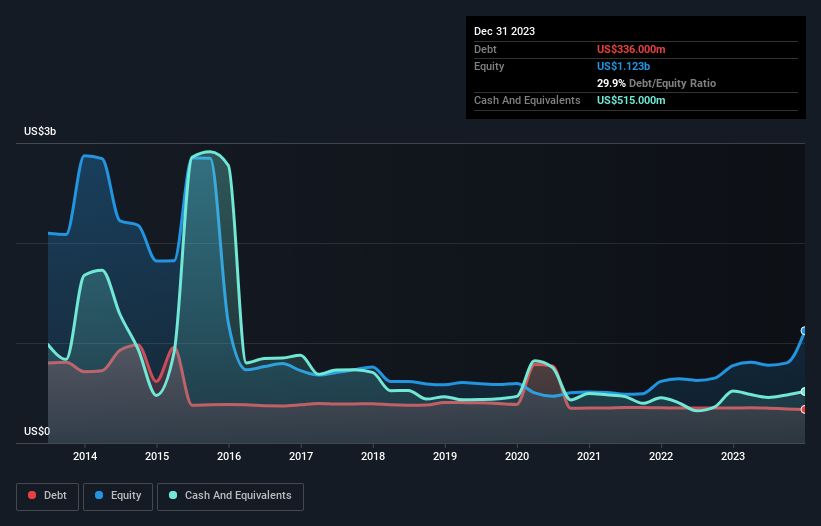Warren Buffett famously said, 'Volatility is far from synonymous with risk.' So it seems the smart money knows that debt - which is usually involved in bankruptcies - is a very important factor, when you assess how risky a company is. We can see that Visteon Corporation (NASDAQ:VC) does use debt in its business. But is this debt a concern to shareholders?
What Risk Does Debt Bring?
Debt is a tool to help businesses grow, but if a business is incapable of paying off its lenders, then it exists at their mercy. Part and parcel of capitalism is the process of 'creative destruction' where failed businesses are mercilessly liquidated by their bankers. However, a more frequent (but still costly) occurrence is where a company must issue shares at bargain-basement prices, permanently diluting shareholders, just to shore up its balance sheet. Of course, the upside of debt is that it often represents cheap capital, especially when it replaces dilution in a company with the ability to reinvest at high rates of return. The first step when considering a company's debt levels is to consider its cash and debt together.
Check out our latest analysis for Visteon
What Is Visteon's Debt?
The chart below, which you can click on for greater detail, shows that Visteon had US$336.0m in debt in December 2023; about the same as the year before. However, it does have US$515.0m in cash offsetting this, leading to net cash of US$179.0m.

How Healthy Is Visteon's Balance Sheet?
Zooming in on the latest balance sheet data, we can see that Visteon had liabilities of US$931.0m due within 12 months and liabilities of US$673.0m due beyond that. On the other hand, it had cash of US$515.0m and US$769.0m worth of receivables due within a year. So its liabilities total US$320.0m more than the combination of its cash and short-term receivables.
Of course, Visteon has a market capitalization of US$2.99b, so these liabilities are probably manageable. However, we do think it is worth keeping an eye on its balance sheet strength, as it may change over time. Despite its noteworthy liabilities, Visteon boasts net cash, so it's fair to say it does not have a heavy debt load!
On top of that, Visteon grew its EBIT by 46% over the last twelve months, and that growth will make it easier to handle its debt. When analysing debt levels, the balance sheet is the obvious place to start. But it is future earnings, more than anything, that will determine Visteon's ability to maintain a healthy balance sheet going forward. So if you're focused on the future you can check out this free report showing analyst profit forecasts.
But our final consideration is also important, because a company cannot pay debt with paper profits; it needs cold hard cash. Visteon may have net cash on the balance sheet, but it is still interesting to look at how well the business converts its earnings before interest and tax (EBIT) to free cash flow, because that will influence both its need for, and its capacity to manage debt. In the last three years, Visteon's free cash flow amounted to 37% of its EBIT, less than we'd expect. That weak cash conversion makes it more difficult to handle indebtedness.
Summing Up
Although Visteon's balance sheet isn't particularly strong, due to the total liabilities, it is clearly positive to see that it has net cash of US$179.0m. And it impressed us with its EBIT growth of 46% over the last year. So we don't think Visteon's use of debt is risky. When analysing debt levels, the balance sheet is the obvious place to start. However, not all investment risk resides within the balance sheet - far from it. For example - Visteon has 2 warning signs we think you should be aware of.
If you're interested in investing in businesses that can grow profits without the burden of debt, then check out this free list of growing businesses that have net cash on the balance sheet.
New: Manage All Your Stock Portfolios in One Place
We've created the ultimate portfolio companion for stock investors, and it's free.
• Connect an unlimited number of Portfolios and see your total in one currency
• Be alerted to new Warning Signs or Risks via email or mobile
• Track the Fair Value of your stocks
Have feedback on this article? Concerned about the content? Get in touch with us directly. Alternatively, email editorial-team (at) simplywallst.com.
This article by Simply Wall St is general in nature. We provide commentary based on historical data and analyst forecasts only using an unbiased methodology and our articles are not intended to be financial advice. It does not constitute a recommendation to buy or sell any stock, and does not take account of your objectives, or your financial situation. We aim to bring you long-term focused analysis driven by fundamental data. Note that our analysis may not factor in the latest price-sensitive company announcements or qualitative material. Simply Wall St has no position in any stocks mentioned.
About NasdaqGS:VC
Visteon
An automotive technology company, designs, manufactures, and sells automotive electronics and connected car solutions for vehicle manufacturers.
Flawless balance sheet and undervalued.
Similar Companies
Market Insights
Community Narratives



